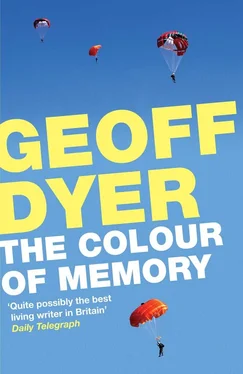A little further on someone had sprayed DON’T CATCH IT on a clean white wall.
With the good weather everything changed for the better. Boredom turned to leisure. People with no work were glad once again that they didn’t have jobs to go to. What to do was no longer a problem. Everyone felt bouncy and fresh as new tennis balls.
Freddie was getting better too. The bruising had come out and the dizziness had passed. Apart from some discolouring around one eye you could hardly tell that anything had happened to him. I ran into him late one morning as he bought a paper from the stall outside the Prince of Wales on the corner of Cold Harbour Lane. A couple of years ago the man who ran this stall had handed Freddie his paper with the words: ‘Now you look like what I’d call a radical intellectual sir.’ It made Freddie’s day — it made his year — and since then he’d always bought his paper from the same bloke.
‘You’re looking great Freddie,’ I said as we strolled around the market, enjoying the smell of the new season. He was wearing a crumpled linen jacket and had the look of someone who might go on to write novels set in south-east Asia.
‘You bet. I’m thriving both physically and financially.’
‘You’ve sold a story?’
‘Not exactly. But I did sell Steranko my bike.’
‘How much for?’
‘Sixty quid.’
‘This calls for a celebration,’ I said, offering him a wine-gum.
‘What about you?’ Freddie said. ‘What have you been doing?’
‘I’ve started the long slow fade to retirement and senility. I take each day a little easier than the previous one.’
‘You were saying that three years ago.’
‘I was joking then. Now it’s really happening. I didn’t realise it at the time but those jokes were just a premonition of what was to come.’
‘What is the past though,’ said Freddie, ‘if not an intense premonition of the inevitable?’
We walked past the side of Woolworths, past one of those badly painted murals depicting a multi-racial society where women are the equal of men, where no one is discriminated against because of their age or race or sex, where work looks like play and play looks like work because it’s all painted with a childlike simplicity and the sun never stops shining. Across the road, like nothing in the mural, guys hung outside the Granada Car Hire or sat chewing in the Acapulco. An old man came out of the door, dragging a leg that was heavy and useless as a sledgehammer.
We ate a pizza in Franco’s in the covered market. It was a tiny place with room for only a dozen people inside, either on stools or at tables. Outside in the Arcade there were more tables but these were always full too. It was the sort of place where it was nice to hang out but because it was so crowded and there were always so many people waiting to get served you had to do your hanging out quickly. With people eating or queuing for tables or waiting for takeaways there was hardly room for the waiters to move. There was hardly even room for the opera which tumbled to the floor from two speakers high up on the wall. After ten minutes we got a table outside which was fine because the sunlight and warmth fell through the high glass roof of the Arcade.
‘I heard a gunshot last night,’ said Freddie, cutting his pizza into meticulous slices.
‘How do you know it was a gunshot and not a car backfiring?’
‘You can tell.’
‘How?’
‘A gunshot sounds exactly like a car backfiring. A car backfiring sounds exactly like a gunshot. It’s called a paradox lieutenant.’ He said it in a kind of fast drawl, the whole sentence coming out like one long corrugated word.
We left Franco’s and walked to the health food shop so that Freddie could gawp miserably at the woman who worked there.
Inside there was a long queue of people waiting to pay. You always had to wait here. Learning to roll joints in the back of the shop with the right proportion of hash and herbal smoking mixture was a higher priority than mastering mental arithmetic as far as the staff were concerned. Not being in a hurry was part of the underlying ideology of the whole place. What really made the staff happy was a customer asking if he could see the boss — then they could point out that there was no boss, the shop was a collective.
‘Excellent,’ said Freddie, seeing the size of the queue and picking up a pack of wholewheat spaghetti. ‘Bigger the queue, longer the look.’
We shuffled towards the counter. The woman Freddie claimed to have been in love with for almost two years was wearing a black vest; her hair was tied up in a scarf. Her arms were tanned; she looked energetic and full of health (in sharp contrast to the rest of the staff who looked like they could use a plate of steak and chips).
As luck would have it we got served by the man behind the counter. Once the guy had grappled with the addition for a couple of minutes Freddie handed over an irritable five pound note and paid for everything. We both said hello to the woman who was laughing with the person she was serving.
‘Things really seem to be hotting up between you two,’ I said as we headed away from the counter.
‘Beauty is an idea,’ he said after we’d stepped outside and clumsily held the door open for a young woman with a pram and a heavy bag of shopping. ‘That’s the beauty of it.’
As we walked towards Effra Road we saw the green, black and gold flag of the ANC fluttering over the Town Hall. Further on we saw workers hurrying out of a small factory. They carried lunch-boxes and tool bags. Some were in a hurry to catch buses, others walked slowly, talking and joking in groups or in pairs.
‘That’s one of the nicest things you can ever see isn’t it?’ said Freddie.
‘What?’
‘People coming out of a factory into the sun.’
We crossed the road to my flat and for the first time that year sat drinking beer on the roof. Every now and then a plane passed overhead.
I ran for a bus and hauled myself on as it accelerated away from traffic lights. The bus swung round a corner as I lurched to a seat just behind the driver’s cabin. It wasn’t until I looked up that I noticed the driver: a beautiful black woman, her face in profile as she looked out across traffic filtering in from the right-hand lane. She was wearing a pale blue T-shirt, gold earrings; muscles moved in her arms as she hauled the wheel round. When the bus was held up at lights or in heavy traffic the conductor leaned across me and spoke to her through the tiny strip of open window just above my head. To speak to the conductor the driver had to twist round in her seat and lean out the open door of the cab. As soon as the traffic cleared the bus accelerated smoothly away. Some kind of race was going on with another bus. If we were in front and slowed down to pick up passengers the bus behind would pass us quickly; and then, a few minutes later, we would overtake again. Every time it happened our driver laughed at the man driving the other bus. Whenever we approached a stop where no one wanted to get on or off the conductor gave two sharp tugs on the cord to tell the driver not to stop and in this way we gradually pulled clear of the other bus.
Every couple of minutes our driver waved to drivers in other buses, grinning at them. An elderly white couple got off while the bus waited at lights and gave the thumbs up sign to her and she waved and grinned back. I watched her and wondered about her life, about where she lived, and if she was married.
Executives complain of stress and fatigue but it’s as nothing compared with the effort involved in conducting or driving buses in rush-hour traffic five or six days a week. No businessman in the city worked harder than this woman. Driving this bus was something to be proud of — and it was a pride in which everyone who saw her shared — for a few minutes, a few stops. Watching her heaving the bus around so easily you sensed that what she was capable of would always transcend her circumstances and for once, rather than being a source of frustration, this certainty was a kind of affirmation; an affirmation of human potential of the same order as that glimpsed in a work of art or in the performance of any kind of sport, or in the playing of a musical instrument.
Читать дальше












